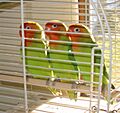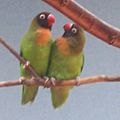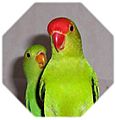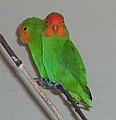Lovebird facts for kids
Quick facts for kids Lovebird |
|
|---|---|
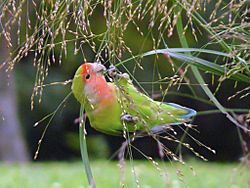 |
|
| A feral Rosy-faced Lovebird eating seeds in Chicago, USA | |
| Scientific classification | |
| Kingdom: | |
| Phylum: | |
| Class: | |
| Order: | |
| Superfamily: | |
| Family: |
Psittaculidae
|
| Subfamily: |
Agapornithinae
|
| Genus: |
Agapornis
|
Lovebirds are a type of small parrot from the genus Agapornis. There are nine different species of lovebirds. These birds are known for being very social and affectionate. Most lovebird species, seven of them, come from Africa. The Grey-headed Lovebird is special because it lives on the island of Madagascar.
Lovebirds get their common name because they form strong, lifelong pairs. They spend a lot of time sitting close together with their partner. These birds live in small groups and enjoy eating fruits, vegetables, grass, and seeds. Some lovebirds, like the Black-winged Lovebirds, also eat insects and figs. The Black-collared Lovebirds need specific native figs to eat, which makes them harder to care for as pets.
Types of Lovebirds
There are nine main species of lovebirds. Each one has unique colors and lives in different parts of Africa or Madagascar.
African Lovebirds
- Yellow-collared Lovebird (Agapornis personatus)
- These lovebirds are about 14 cm (5.5 in) long. They are mostly yellow and green with blue tail feathers. You can find them in northeast Tanzania.
- Fischer's Lovebird (Agapornis fischeri)
- Also 14 cm (5.5 in) long, these birds are mostly green. They have an orange upper body and head, blue lower back, and a red beak. They have white rings around their eyes. They live south and southeast of Lake Victoria in northern Tanzania.
- Lilian's Lovebird (Agapornis lilianae)
- This species is about 13 cm (5 in) long. They are mostly green, with an orange head and a red beak. They also have white rings around their eyes. They are found in Malawi.
- Black-cheeked Lovebird (Agapornis nigrigenis)
- These lovebirds are 14 cm (5.5 in) long. They are mostly green with brownish-black cheeks and throat. They have a reddish-brown forehead and an orange upper chest. Their beak is red, and they have white eye-rings. They live in Zambia.
- Peach-faced Lovebird (Agapornis roseicollis)
- Growing to about 15 cm (6 in), these birds are mostly green with an orange face. They have a blue lower back and a horn-colored beak. You can find them in Angola, Botswana, Namibia, and South Africa.
- Black-winged Lovebird (Agapornis taranta)
- Red-headed Lovebird (Agapornis pullarius)
- About 15 cm (6 in) long, these lovebirds are mostly green with red on their upper neck and face. Males have more red on their face and head, and their red beak is darker than the female's. They live in a large part of central Africa.
- Black-collared Lovebird (Agapornis swindernianus)
- This species is 13.5 cm (5.3 in) long. They are mostly green with a brown collar that has a black edge at the back of the neck. Their beak is dark grey or black. They live in Equatorial Africa.
Madagascar Lovebird
- Grey-headed Lovebird (Agapornis canus)
- These lovebirds are about 13 cm (5 in) long. They are mostly green with darker green on their back and a pale grey beak. Only the male has a grey upper body, neck, and head. They are native to Madagascar.
Images for kids
-
A yellow-collared lovebird perching by the entrance to a nest box in a large aviary at the Honolulu Zoo, Hawaii, USA
See also
 In Spanish: Inseparables para niños
In Spanish: Inseparables para niños
 | Victor J. Glover |
 | Yvonne Cagle |
 | Jeanette Epps |
 | Bernard A. Harris Jr. |




